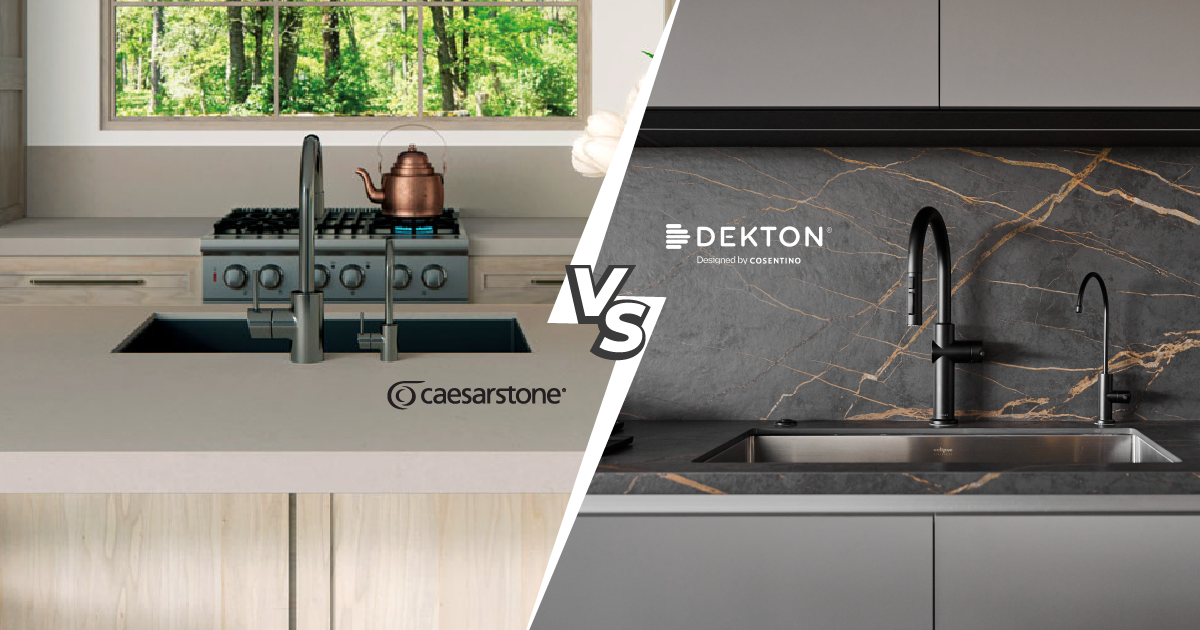
This a question we get asked often…
Well, to begin with, both Caesarstone quartz and Dekton are engineered stone.
However, in different ways.
Caesarstone Quartz: sometimes people hear the word quartz and they automatically think of a natural material. This is because quartz is a kind of natural mineral and it is found in various natural stones. However, “quartz”, as we use the term here, is actually engineered using a process that combines the natural quartz mineral with resins to form a surface that consists of 90% (and often times more than 90%) quartz by the weight. This means that 90%+ of the weight of the slab is a result of the natural mineral quartz, and 7%– is made up of other materials like polyester resins. This is not a complete explanation of how quartz is engineered. Rather, it is a very simplified description of the process.
So, what is Dekton’s engineering method? Dekton is created using the same raw materials found in natural rock that has undergone the metamorphization process. The process used to engineer Dekton is called “sintering”. This includes putting the raw materials under extreme pressure, heat, and perhaps even other forces to actually change the materials into a new substance. The result is what Cosentino refers to as an ultracompact surface named DEKTON®.
So, there you have it. Both materials are engineered, but in different ways. Also, quartz contains some natural materials and Dekton does not. But how does that affect buying and owning surfaces made from these materials?
We can begin with the color selection. Caesarstone quartz is available in more colors than Dekton.
However, remember that you are comparing one line of material (Dekton) with an entire type of material (quartz) therefore this is not really comparing oranges to apples. Rather, it is more like comparing apples to citrus. So, how about the long-term comparison?
Both Quartz and Dekton are relatively easy to care for as far as stain resistance and cleaning are concerned. Why is that the case? Because both materials are non-porous and anything that could discolor them stays on the surface of the slab. And although some substances can dry on the surface, you can simply use an appropriate cleaning product to remove the substance from the stone’s surface.
One area of difference between Dekton and quartz is in the resistance to scratches. True, both materials are scratch resistant. However, when using quartz, you are encouraged to use cutting boards and trivets to protect your countertops from damage. With Dekton on the other hand, you are free to cut your vegetables right on your countertop, although we highly recommend the use of cutting boards to protect household utensils.
Finally, quartz and Dekton materials differ in the way they tolerate heat. Quartz is made up of resins and even during the fabrication process professionals must use polishing pads that will not “burn” the material when being polished. On the other hand, Dekton is produced in very extreme heat and once it is changed into the ultracompact surface, it can withstand an extremely high temperature. So much so, that it does not need a trivet. That’s right, you can set pots and pans directly from the stove directly on Dekton countertops.
In closing, there are a number of similarities between Dekton and quartz surfaces. There are also differences. You will need to decide on the proper Dekton or Caesarstone quartz color choice for your selected design style.
Whichever you go with, you will definitely enjoy your chosen material.
To request a quote, Click here